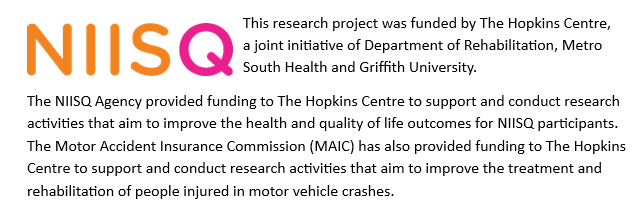Trajectories of Rehabilitation across Complex Environment (TRaCE) 3.0
About the Project
TRaCE 3.0: Secondary complications, access, wellbeing, and vocational outcomes for people living with spinal cord injury and brain injury.
Chief Investigator: Prof. Timothy Geraghty (MSH/THC)
Research Team: Prof Tamara Ownsworth (THC); Dr Christy Hogan (THC); Dr Emily Bray* (THC); A/Prof Melissa Kendall (MSH); Rachel Jones (MSH); Dr Mandy Nielsen (MSH); Dr Kerrin Watter (MSH); Dr Delena Amsters (MSH); Dr Jessie Mitchell* (THC); Dr Letitia Burridge (THC); Dr Kylie Ferguson (MSH); Dr Ryan Bell (MSH); Dr Rachel Brough (THC); Jessica O’Loghlen (THC).
* citizen/lived experience researchers

About
The transition from being an inpatient in hospital to living in the community with a spinal cord injury (SCI) or acquired brain injury (ABI) is challenging and requires many skills and resources for success. The TRaCE 3.0 project tracks the patterns of recovery over time for individuals with SCI and ABI, extending from inpatient rehabilitation discharge up to 24 months post-discharge. The study uses data collected from medical records, surveys and interviews to identify the timing of secondary complications, obstacles to service access, access to appropriate housing, and life stressors to determine how these affect independence, vocational outcomes and quality of life. TRaCE 3.0 builds on the previous TRaCE 1.0 (Trajectories of Rehabilitation across Complex Environments) and TRaCE 2.0 (Improving System Transitions and Access for Complex Rehabilitation Populations) projects by conducting a more in-depth exploration of service access and experiences of rehabilitation and support through semi-structured interviews.
Aim and objective
TRaCE 3.0 aims to:
1. Map and describe secondary complications, service access obstacles, and life stressors during the pathways back to home and work, as well as the stability of outcomes and wellbeing in people with SCI and ABI following discharge from inpatient rehabilitation.
2. Analyse personal expectations and experiences of rehabilitation and support after ABI and SCI following discharge and across the care continuum
3. Inform improved service coordination and individualised planning of appropriate, targeted and timely rehabilitation to improve outcomes
Expected outcomes
Information gained from participants will provide an increased understanding of unmet need regarding specialist and generalist community services after discharge from inpatient rehabilitation, wellbeing, cost burden, secondary complications and stressors, and community reintegration outcomes.
Findings will generate in-depth understanding of people’s recovery trajectories and their experiences of rehabilitation, particularly in relation to the timing, nature and impact of secondary complications and life stressors and potential targets of intervention. This in turn will inform novel interventions and service models to improve timely access to rehabilitation that is matched to individuals’ personal preferences and life situations.
Impact
This research will highlight subgroups who are most at risk of poor outcomes and inform strategies for enhanced personalised rehabilitation pathways, through coordinated and targeted services and supports. TRaCE 3.0 will identify points in the journey following discharge where service access could be improved to facilitate return to independence and productive participation in work, the community, and social engagements.
Preliminary results
Initial analysis of the qualitative data from discharge and 3 month post-discharge interviews with participants with SCI identified 3 three main themes, which depicted how services and supports helped with resuming life and what matters to me (theme 1) by setting me up (theme 2) or contributed to holding me back (theme 3) when perceived as insufficient. Initial analysis of the qualitative data from discharge and 3 month post-discharge interviews with participants with ABI and family members has commenced.
Project status and timeframe
Recruitment of participants to the study commenced in June 2023 and will continue until July 2024. Discharge and 3 month post-discharge data collection is in progress and 12 month post-discharge data collection will commence in June 2024. Initial qualitative data analysis of discharge and 3 month post-discharge interview data has begun. Data collection will be completed late 2025.

View All Researchers

